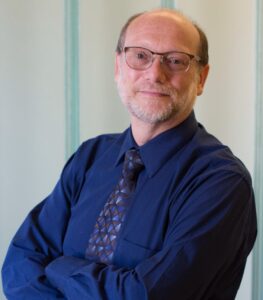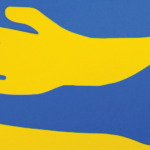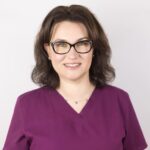“We pack up our backpacks with our medical kits,” says Dr. Pillinger. “We take whatever medications we have and whatever translators we have in our group,” and see patients.
They don’t treat emergency needs, such as wounds from military missile blasts. Instead, they see patients who have chronic conditions and other illnesses, at times calling on lessons learned in medical school to offer care not necessarily related to their specialty, notes Dr. Pillinger.

Dr. Pillinger
The team arrived with medical supplies and medications donated by NYU Langone Medical Center. But doctors still have serious shortages in supplies of biologics, says Dr. Rackoff.
“We’re doing our best with the medications we brought in giant orange duffle bags,” adds Dr. Pillinger.
More rheumatologic medicines are needed, especially to treat rheumatoid arthritis and psoriatic arthritis. Dr Rackoff says she would love to see pharmaceutical companies on board to deliver more donated medicines to Ukrainian cities where they are badly needed.
Most of those drugs are approved for use in Ukraine, notes Dr. Rackoff, “but being approved doesn’t mean the people have access, especially access during times of war.”
Before the Russian invasion, local government programs partially funded medications for rheumatic conditions but the war changed that, says Marta Dzhus, MD, PhD, professor of rheumatology at Bogomolets National Medical University, Kyiv, Ukraine, who met with Dr. Rackoff and her group. “It is very difficult for our patients to pay for biologic medicines,” says Dr. Dzhus.
Dr. Pillinger encourages doctors to consider volunteering and says “there’s a place for us rheumatologists,” as well as other internists, to help patients displaced by the war. Many have minor medical needs but have been driven out of their homes in cities and towns under military attack.
“We’re taking care of a group of people who know they need to get on with life and need care,” says Dr. Pillinger. “They’re extraordinarily grateful, which is a wonderful thing.”
Castle of Help & Hope
Poland continues to help refugees who began fleeing Ukraine when the war began. The generosity of spirit that prompted Polish citizens to open their homes to Ukrainians once they crossed the border can be seen in individuals who continue to do what they can to help, notes Dr. Pillinger.
The team met a woman who created a center for displaced families in a castle in declining condition near the Polish city of Krakow. She took the lead to find shelter for a group of people who had nowhere to go. She is an extraordinary woman, says Dr. Pillinger: “She’s been there since the beginning, every day.”


